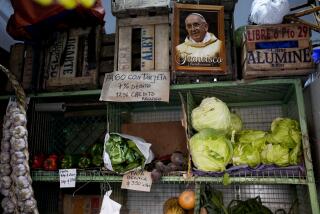Argentines Asked to Redeposit Withdrawals
- Share via
BUENOS AIRES — Argentine Economy Minister Domingo Cavallo on Tuesday urged citizens to return almost $10 billion they have pulled from domestic banks since the end of June, saying it would help the country avoid a currency devaluation and debt default.
That money, he told a group of economists and students, remains in Argentina and could help make the financial system stable. Depositors stepped up withdrawals in the last six weeks on concern the government may freeze accounts to avoid a default, or may devalue the Argentine peso by giving up its one-to-one peg with the U.S. dollar.
“If in the next week the almost $10 billion that left the financial system, but is still in Argentina, returns and comes back day after day, you will see once again credit rates drop, and that will reactivate the economy,” he said at an economic conference. “We will be able to emerge from the depression.”
Cavallo made the appeal as an Economy Ministry team negotiated in Washington for fresh International Monetary Fund loans.
Investors remained cautious on concern the IMF may fail to approve new financing to ensure the country averts a default on its $130 billion of debt: The price of Argentina’s benchmark bond due in 2005 fell again Tuesday, driving the yield to 27.3%. The Merval stock index slid 3.1% to 316.60.
Deposits at private and state-owned banks fell to $74.7 billion as of Thursday from $83.7 billion at the end of June. Total deposits have been falling at a rate of $310 million a day as frightened Argentines hoard cash.
“People have this constant fear of a peso devaluation,” said Claudio Urdampilleta, 40, who works for the city of San Miguel in the Buenos Aires region. “Those who have some money saved are not spending it. They could, but they don’t because they are not sure about the future.”
A devaluation would immediately slash Argentine consumers’ purchasing power, though it also could have beneficial effects, such as making Argentine exports less expensive in the world market.
The government recently approved spending cuts, including a 13% reduction in state salaries and pensions, to convince investors it can meet its obligations.
Across the nation, groups of unemployed Tuesday began their third protest in as many weeks against the cuts, with plans to block roads for 72 hours.
In his speech, Cavallo reiterated that the government intends to pay its debts and keep the peso stable. “A devaluation and restructuring of debt would end up destroying the institutions that take care of savings, that’s to say banking and pension systems,” Cavallo said.
Later, Cavallo told a group of construction industry executives that Argentina would never become Wall Street’s “guinea pig” to test theories of devaluation.
More to Read
Sign up for Essential California
The most important California stories and recommendations in your inbox every morning.
You may occasionally receive promotional content from the Los Angeles Times.













